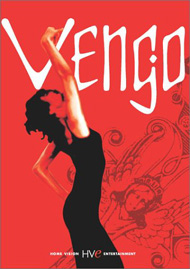| Release List | Reviews | Price Search | Shop | Newsletter | Forum | DVD Giveaways | Blu-Ray/ HD DVD | Advertise |
| Reviews & Columns |
|
Reviews DVD TV on DVD Blu-ray International DVDs Theatrical Reviews by Studio Video Games Features Collector Series DVDs Easter Egg Database Interviews DVD Talk TV DVD Talk Radio Feature Articles Columns Anime Talk DVD Savant HD Talk Horror DVDs Silent DVD
|
DVD Talk Forum |
|
|
| Resources |
|
DVD Price Search Customer Service #'s RCE Info Links |
|
Columns
|
 |
Vengo
|
||||
Fans of Flameco music will love this atmospheric and authentic-feeling tale of Gypsy revenge on the Spanish desert, as it is constantly interrupted with performances of singing and dancing. The revenge tale is dry and mostly uneventful, and gets in the way of the music; although leading player Antonio Canales is believable as a tormented gypsy patriarch, the drama is too thin to support the film. What you'll remember most are the infectious flamenco rhythms, and the attractive photography.
Vengo gets an "A" for music, but falters elsewhere. The fairly realistic story is irrelevant to the frequent musical numbers, which occur at festivals, private parties, and in nightclubs. In between, people play the music on boomboxes. It all sounds great. Gypsy music is a distinctive wailing singing accompanied on the guitar. In Vengo we get to see and hear a number of local performers. One moorish-inflected artist's style seems a direct link to Flamenco's Islamic roots. This isn't flashy cabaret or tourist flamenco. More men dance than women, and there aren't any frilly costumes. The female dancers wear whatever they're wearing; one dances in blue jeans. Taken as straight performance, the movie soars, but unfortunately there's this slow revenge tale holding it together. It's more than a bit awkward when the hero Caco interrupts his hang-dog moping to talk about the next party and what talent's going to be hired. The families seem to party almost every night, hiring name talent, and the effect is like one of those bad AIP rock'n roll movies where ordinary teens have connections to big-name bands, who like nothing more than to get down and boogie with the kids. The revenge angle is not very interesting. The grieving Caco only interacts with his confederates (family, bodyguards) and his impaired nephew Diego. The actor playing Diego is so convincing in his affliction (slurred speech, jerky, twisted body movements) that he may be a genuine handicapped person, who acts. Besides being affectionate with Diego, which he expresses by setting the boy up with a hooker, Caco does little more than brood in silence and engage in tentative tangles with the threatening Caravacas. We don't learn much more about what there is to being a gitano except their pride and belligerence, and that's not very flattering. There's no love interest in the story, and not a single major female character. So the show hinges on the music, which will delight Flamenco-gypsy fans looking for something contemporary and (presumably) authentic. Spanish speakers will think that the title Vengo is misleadingly translated as "I come" (from the verb venir), when by the content of the film it would seem to really be "I revenge" (from the verb vengar). But both translations are probably wrong as one of the early titles was Vengo del Moro - "I come from the Moor", meaning "I'm descended from Moorish blood". HVe's DVD of Vengo is immaculately mastered and looks great on a large monitor. The stereo sound is rich and lush. For extras, there are a pair of interviews with actors Antonio Canales and Antonio Dechent. They're both very Spanish and very opinionated, and neither really illuminates much about the movie for outsiders. Pedro Cortes provides liner notes about the roots of the flamenco music, in an essay that's non-specific to this movie. A second extra is a short film called Los Almendros-Plaza Nueva, directed by Álvaro Alonso. In about a half hour, it has four or five gypsy performers singing on a bus as it drives through Almería. It's a formless and moderately annoying framework on which to hang the very special musical content. Once again, for effect: Flamenco-gypsy fans will be enchanted, but those expecting a good drama will probably feel let downby Vengo.
On a scale of Excellent, Good, Fair, and Poor,
Vengo rates:
Review Staff | About DVD Talk | Newsletter Subscribe | Join DVD Talk Forum |
|
| Release List | Reviews | Price Search | Shop | SUBSCRIBE | Forum | DVD Giveaways | Blu-Ray/ HD DVD | Advertise |






